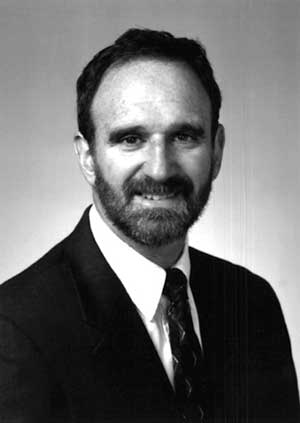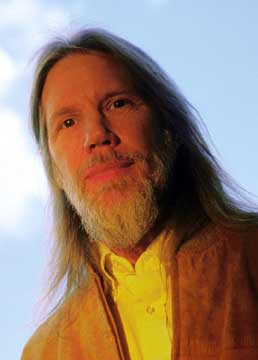
|
|
Martin Hellman
|
Two innovators whose mathematical formulations developed nearly 25 years ago unleashed the key to private communications and secure transactions on the Internet will receive the 26th annual Marconi International Fellowship award Oct. 10, for their breakthrough invention and activism in the cause of privacy rights. Whitfield Diffie and Martin Hellman will share the $100,000 fellowship prize honoring advances in telecommunications for humanitarian benefit, to be presented at Columbia, which serves as the academic home of the Marconi International Fellowship Foundation.
The Marconi award is the most prestigious in the field of telecommunications and information technology. To recognize this important prize in the field, the Marconi Foundation will host a forum at 4:30 p.m. Tues., Oct. 10, in Davis Auditorium at the Schapiro Center with notable representatives from industry, academia and government. George Heilmeier, inventor, engineer, former head of Bellcore, (subsequently Telcordia Technologies) and a founding member of the Marconi Foundation, will speak on "From Pots to Pans.com: Thoughts and Predictions About Information Systems for this Decade and Beyond." His presentation, open to the campus community, will be followed by discussion from a panel of experts and the audience, including engineering dean Zvi Galil; professor John Pavlik, director of the Columbia New Media Center at the Graduate School of Journalism; the 200 Marconi Fellowship honorees, Diffie and Hellman, and past Marconi Fellows Eric Ash (for leadership in electronic technology), Leonard Kleinrock (for pioneering work in computer networks) and Paul Baran (for packet switching and other communications advances). A reception honoring this year's Marconi Fellows will follow.
In 1976, Diffie and Hellman published "New Directions in Cryptography" describing their protocol as public key cryptography, which enables secure electronic transactions and has been called the "sealing wax" of the information age. The Diffie-Hellman key agreement, which depends on a discrete logarithm for its security, was fundamental to the development of the world of e-commerce. Their invention protects global confidence in both the privacy and authenticity of messages on the Internet.
The two scientists, working in the relative isolation of academia at Stanford, were able to conceive an idea of revolutionary import that had escaped thousands of researchers working in secret government agencies. Their discovery opened the field of cryptography to unclassified academic study. Diffie, now a distinguished engineer at Sun Microsystems, has spent his career pursuing the theory and application of cryptography. Hellman, professor emeritus at Stanford, in addition to his work in the field, has been concerned with the ethics of technological development.
Both men have become champions of individual privacy rights. Despite vehement demands from the FBI to Congress to keep cryptography in the domain of secret agencies, Diffie has taken a strong stance on opposing limitations on cryptography for business and personal use, and is co-author of the book Privacy on the Line: The Politics of Wiretapping and Encryption. Hellman was co-editor with Anatoly Gromyko, the long-time Soviet ambassador to the United Nations, of Emerging New Thinking, which focused on technology and war and peace issues.
The foundation was established in memory of Guglielmo Marconi, the inventor of wireless transmission that led to the development of radio, by his daughter Gioia Marconi Braga in 1974, 100 years after Marconi's birth. Since then, the foundation has been spotting eclectic innovators in telecommunications whose work has advanced the public good.
Before her death in 1996, Marconi's daughter, Gioia Braga wrote, "Our purpose was to establish a program that would recognize creative work done by scientists and engineers who continue to advance the frontiers of knowledge in the field of communications in the Marconi tradition and that are as dedicated as he was to applying their discoveries to the benefit of mankind."

|
|
Whitfield Diffie
|
Most scientists who receive the fellowship have demonstrated a strong commitment to the public good and many have bridged science and the world of arts and letters. The Foundation also has a history of pinpointing up-and-comers in the telecom world. In 1990, for example, the Marconi Foundation awarded the fellowship to Andrew Viterbi, co-founder of Qualcomm. Nine years later, the company rounded out the last year of the century with its stock having shot up 2,600 percent in just one year.
This year, the Foundation named John Jay Iselin to the position of president. A well-known New York figure whose own career has fused the worlds of arts and sciences, Iselin previously was president of The Cooper Union for the Advancement of Science and Art, one of the country's premier art, architecture and engineering schools. With his arrival at Columbia, Iselin received a joint appointment with the Graduate School of Journalism.
Iselin takes a wide-lens view of the invention of the radio and what it means for the 21st century.
"We went through a period, after the advent of the radio, when we focused on wired technology," said Iselin. "But now we're looking once again to the wireless world, and we have the invention of the radio, modest as it may seem now, to thank for that. I'm pleased to be here, in a place that honors the past while recognizing the wave of the future."
Since the death of Marconi's daughter in 1996, the chair of the Foundation has been Martin Meyerson, Emeritus President and University Professor of the University of Pennsylvania. He has been the President of the Swiss-American Foundation for the International Exchange of Scientific and Cultural Information by Telecommunications and for nearly 20 years he was the overseas governor of the International Research Centre for Environmental Studies in London. For many years Meyerson was the director of the Aspen Institute, where the Marconi Foundation was first housed.
|
